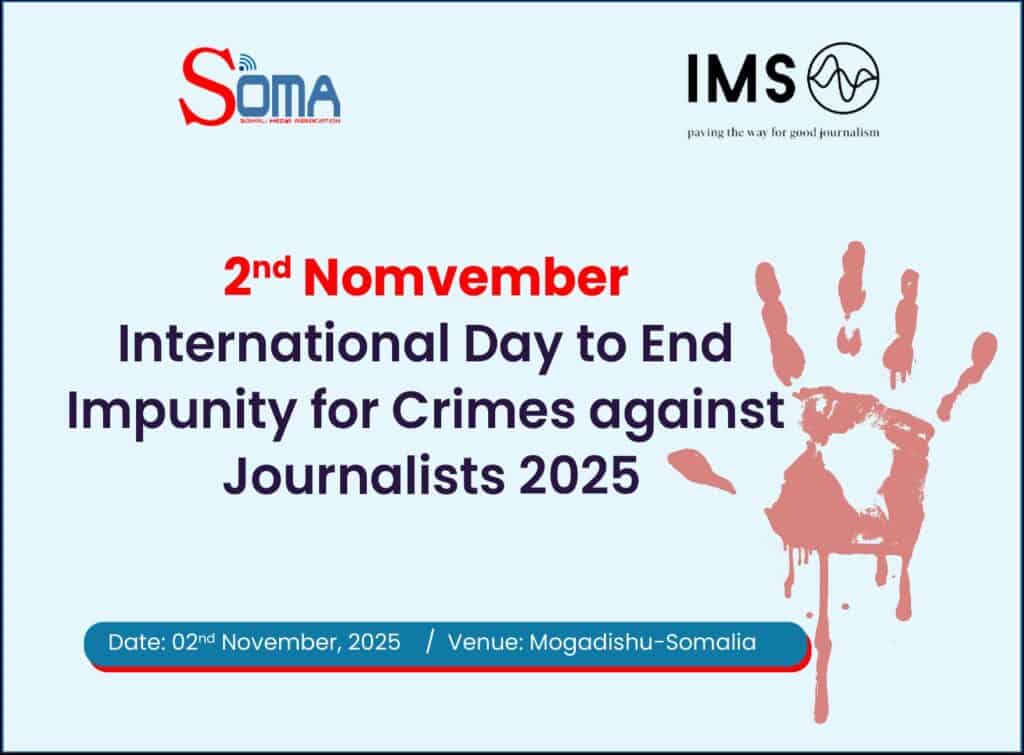By Somali Media Association (SOMA)
On the International Day to End Impunity for Crimes Against Journalists
In Somalia, journalism has become a battlefield — one where truth itself is under siege. From the streets of Mogadishu to the alleys of Hargeisa, Somali journalists are caught between government forces that detain and assault them and Al-Shabaab militants who hunt them down and kill them for telling the truth.
In the last 12 months, between November 2024 and October 2025, at least 123 journalists have faced harassment, unlawful arrest, torture, or obstruction. Most of these violations occurred in Mogadishu, where institutions sworn to uphold the law have instead become its greatest violators.
SOMA’s monitoring reveals a disturbing trend: journalists are being silenced not just by extremists, but by the very security agencies meant to protect them. Out of the 123 cases SOMA recorded:
- 61 journalists were arrested, all without warrants.
- 10 were tortured or beaten during reporting or detention.
- 30 were suspended or denied work access for political reasons.
- 22 were directly threatened, often by armed officers.
The regional breakdown paints a bleak picture: Mogadishu (76), Somaliland (32), Garowe (2), Dhuusamareeb (2), Laascaanood (3), Gaalkacyo (4), Cadaado (2), and Afgooye (2).
Only three journalists out of the 123 have ever appeared in court — one in Mogadishu and two in Somaliland — proving that impunity, not justice, rules the day. Among those affected, 10 are women, many of whom endure gender-based violence and public humiliation simply for doing their jobs.
On 19 December 2024, Risaala Media journalists Shukri Caabi Abdi and Ali Hassan Guure were violently attacked by NISA officers while covering a peaceful protest in Boondheere, Mogadishu.
Ali was forced at gunpoint to delete all his footage. Shukri was beaten, her headscarf torn off, and her head stamped on with a boot.
“I was humiliated, kicked, and threatened with death,” Shukri recalls. “But I refuse to be silenced. Journalism is light — and I will not let that light die.”
A year later, Shukri’s wounds are still visible — and so is the silence. No investigation. No arrests. No justice.
“I still carry the scars of that day,” she says. “No one has ever been held accountable. There is nowhere to seek justice in this country.”
Ali, meanwhile, continues to live in fear every time he holds a camera:
“When I film, I constantly look over my shoulder. If the forces catch me, they delete my work, seize my camera, and beat me — just as they’ve done before.”
On 6 August 2025, police raided the offices of SMS TV, confiscating broadcasting equipment and detaining journalists Hussein Isse Mohamed and Osman Abdullahi Arab for two days — without a warrant, without charges.
Their “crime” was reporting on forced evictions in the Siinay neighbourhoods of Mogadishu — a story authorities wanted buried.
“After two days in detention, they just said, ‘You can go,’” Osman recalls. “They deleted all our footage and kept our memory cards. No one explained why we were arrested.”
“We were punished for reporting the truth,” Hussein adds. “There was no law, no accountability — only power and impunity.”
Justice Claimed, But Not Felt. Hassan Ali Nur “Shuute”, Chairperson of Somalia’s Military Court, insists that justice has been served in some cases. He points to the executions of Al-Shabaab figures such as Hassan Hanafi, convicted for orchestrating the assassinations of multiple journalists including Sheikh Nur Abkey, and Mohamed Mahmoud Tima’ade.
He also cites the execution of a soldier convicted of killing a journalist, saying, “This shows our commitment to justice.”
Yet these rare convictions are exceptions — not the rule. For every convicted killer, dozens of abusive officers and officials escape punishment. Even journalist Mohamed Abdulwahab “Abuuja”, wrongfully accused of terrorism, was freed only after a long ordeal — a reminder of how easily justice in Somalia can turn into persecution.
Farhia Mohamed Kheyre, Chairperson of the Somali Women Journalists Organization (SWJO), echoed this call:
“Journalists shed light for the public — they present the truth even when it is bitter. Justice must protect them. Female journalists play a critical role in informing the public; they must be allowed to practice their rightful jobs.”
Somali journalists are not asking for privilege — only for the right to work without being beaten, jailed, or killed. They demand a government that upholds the constitution, a police force that serves the people, and a judiciary that delivers justice, not excuses.
SOMA’s Call to Action
On this International Day to End Impunity for Crimes Against Journalists, the Somali Media Association (SOMA) demands urgent and concrete action:
- End government and security-forces’ attacks on journalists performing their duties.
- Bring to justice Al-Shabaab members responsible for killing or targeting media workers.
- Protect female journalists from harassment and gender-based violence.
- Hold commanders and police officers accountable for arbitrary arrests and torture.
- Reform the justice system to ensure independent investigations into all media-related abuses.
- Urge international partners to stand with Somalia’s press-freedom defenders through legal and technical support.
Impunity is not just a legal failure — it is a national disgrace. Until justice prevails, Somalia’s journalists will continue to risk their lives to keep the truth alive.

